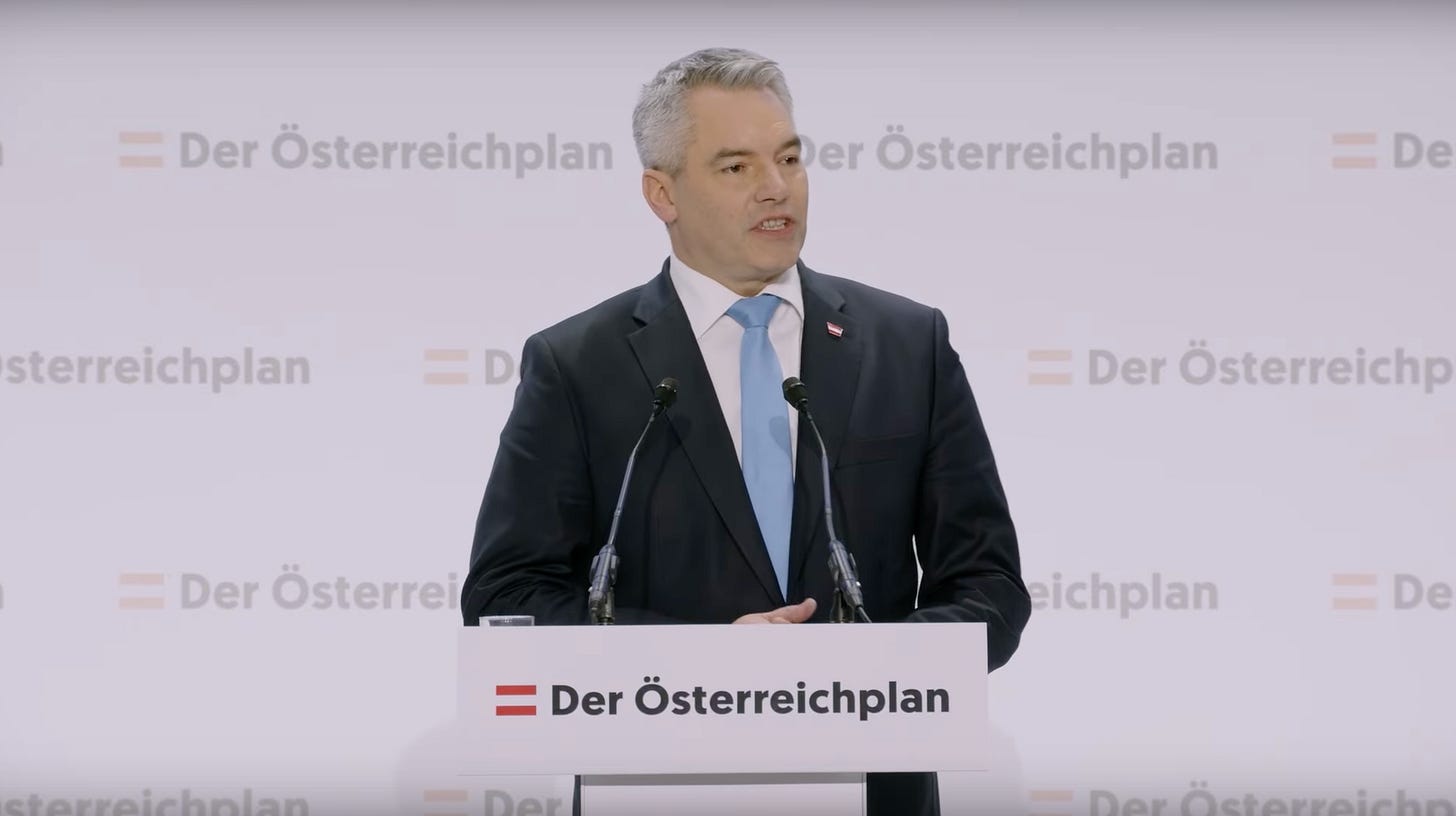Nehammer's Austria Plan
The chancellor presented the ÖVP’s plan for Austria's future on Friday, which included tax cuts, greater home ownership, and a hostile environment for migrants
Servus!
The current rumor doing the rounds is that the next parliamentary elections in Austria will take place on June 9—the same day as elections for the European Parliament. The demand to combine the one with the other comes mainly from the conservative People’s Party (ÖVP), which began its election campaign in all but name on Friday when chancellor Karl Nehammer outlined his “Austria plan” in a speech to the party faithful in Wels. Heavily trailed in the press beforehand, his address was nothing less than the ÖVP’s election manifesto read aloud.
The foundation of Nehammer’s Austria plan is a series of tax cuts. The basic rate of income tax will be lowered from 20 percent to 15 percent, while the 48 percent rate those earning between approximately €67,000 and €99,000 a year will be eliminated. Workers who do overtime will no longer have to pay tax on that income. Savers will no longer have to pay capital gains tax on savings under €100,000. And it’s a firm no from the ÖVP to either a wealth tax or inheritance tax, both supported by the Social Democratic Party (SPÖ)1.
Pensioners can feel well catered-to by Nehammer’s plan. People over the age of retirement will no longer have pay pension insurance contributions if they stay in work, while working grandparents will be allowed to take leave akin to parental leave to care for their newborn grandchildren. Nehammer is also looking out for aspirational homeowners. First-time buyers will be able to access loans guaranteed by the state, while a ‘right to buy’ scheme would be introduced for residents of rented cooperative apartments (Genossenschaftswohnungen) with a view to increasing the home ownership rate from 48 percent to 60 percent.
The losers of Nehammer’s plan include immigrants—especially asylum seekers. Immigrants would henceforth only be able to access the full benefits system after five years’ residence. Asylum seekers would have their valuables taken by the state upon arrival to cover their costs to the system, and those who have had their applications for asylum rejected would lose their freedom of movement. Hard time, too, for those out of work. Unemployment benefit will be cut from 55 percent to 50 percent of a recipient’s previous net salary. The ÖVP is going to look to entirely restructure the way unemployment is financed in any case.
As a piece, Nehammer’s plan is bound up by inherent contradictions that make it difficult to see how it could ever be implemented. Via the Red-White-Red card scheme, it would become easier for ‘qualified’ migrants to come to Austria, a country that will, at the same time, become more hostile to new immigrants. The government would give loans to first-time homebuyers, hire 800 new doctors, and invest a billion Euros in the search for the “green combustion engine” while cutting taxes across the board. Rather than a precise program for government, Nehammer’s plan reads more like a wishlist for future coalition negotiations.
Ideologically, it represents a narrow vision for the future written from the right for the right. While his tax agenda might appeal to voters in the center ground, it is more accurate to say the ÖVP’s agenda has been designed with its core supporters in mind: older voters, culturally conservative voters with its ban on gender-inclusive forms of German from official use, and voters on higher incomes with savings. It tells us two things. First, the door is open to a coalition with the far-right Freedom Party (FPÖ). Second, that the two parties of state—the ÖVP and the SPÖ—continue to drift further to the right and left respectively, vacating the political center.
Bis bald!
Thank you for subscribing to the Vienna Briefing. Every recommendation helps, so if you know someone who might be interested in reading this newsletter, consider sharing it with them today.
The Vienna Briefing is a reader-supported publication made possible by your donations. If you would like to contribute to my work, think about sending me a tip.
Fritzl To Be Released
Josef Fritzl is set to be transferred to a prison psychiatric unit, setting the stage for his release to a nursing home at the age of 88, according to his lawyer. Fritzl was sentenced to life inside in 2009 for having raped and incarcerated his daughter in his basement over a period of 24 years.
Demo Against Far-Right
At least 35,000 people attended a demonstration against the far-right outside the Austrian parliament on Friday organized by three NGOs and endorsed by the SPÖ and the Greens. For more on the background to the protest, check out last week’s edition of the newsletter.
Millions For Benko’s Mother?
Signa Development, a subsidiary of now-insolvent property giant Signa Holding, reportedly transferred more than €300 million to two entities controlled by the family of its founder René Benko before its collapse. The entities, Laura Finance Holding and Laura Holding, are subsidiaries of the Laura Foundation controlled by Benko’s mother.
This post previously stated that wealth and inheritance taxes were opposed by the SPÖ. I regret the error.




